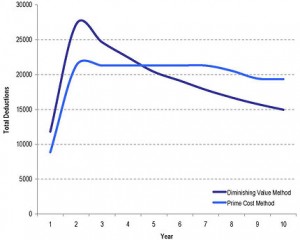By definition, tax depreciation is a legitimate or official deduction against any assessable taxable income that is generated by a commercial investment or residential property. Hence, it is likewise referred to as property depreciation. Tax depreciation actually operates by way of allowing property investors to deduct a particular portion of the original costs of plant, equipment, and capital works like renovations on their investment property for each financial year and over the projected life of the item.
The Australian Taxation Office (ATO) understands that the value of capital assets will eventually reduce (incrementally) over time, as the end of their effective life approaches. So these assets will then be written off as tax deduction legally known as depreciation.
 Provided you own an investment property, regardless of it being new, old, small, or large, there will be two areas of depreciation available to you. These are:
Provided you own an investment property, regardless of it being new, old, small, or large, there will be two areas of depreciation available to you. These are:
-
Plant and equipment
-
Capital works
Additionally, you should know that different items in a rental property will have different rates of tax depreciation, primarily based on that item’s effective life. You can figure it out on your own using a depreciation calculator but you must work with qualified inspectors who have the knowledge as well as expertise in knowing and identifying the exact items that are depreciable. In the process, they also can determine if savings are possible.
In order to claim utmost tax benefits for an investment property, ATO will be requiring property investors to compete and furnish a tax depreciation report that is fully compliant.
The Property Depreciation Report
Also called as the depreciation schedule, the property depreciation report lays out all the tax depreciation and building write-off claims for both new and existing investment property. For example, a DEPPRO property depreciation tax report furnishes a forty-year schedule for capital works allowance as well as depreciable assets on a specific investment property. This is to make sure that the owners of those properties will be able to receive their rightful maximum tax entitlements.
Benefit of Tax Depreciation to Investors
Everyone should realize that claiming tax depreciation allowances on the investment property will correspond to increasing its value by way of giving investors better returns on their investment. In essence, depreciation allowances, when combined with added negative factors like repairs, maintenance, and interest on a mortgage, will help investors eventually reduce taxable income, which later means paying less tax and then the improvement of cash flow.
What is Tax Depreciation?,